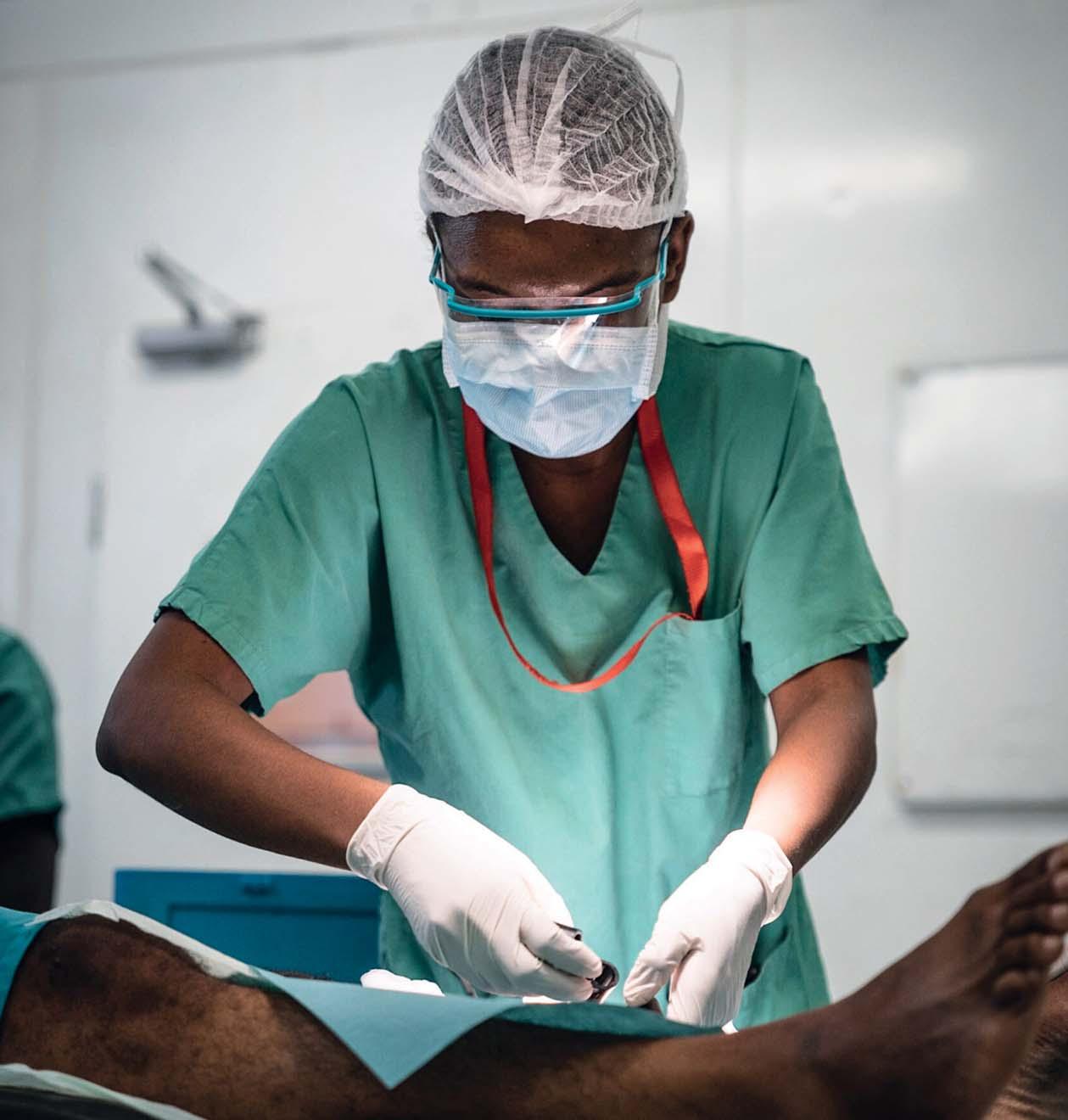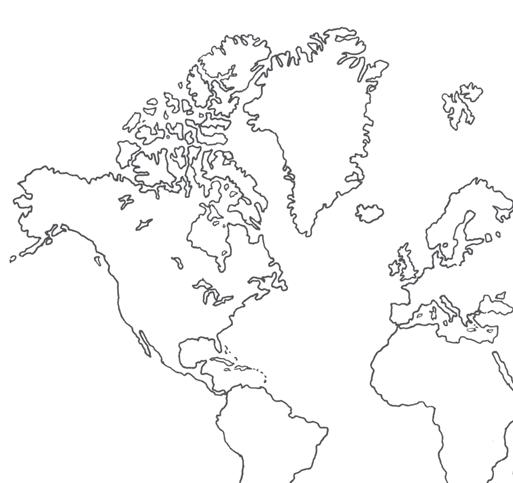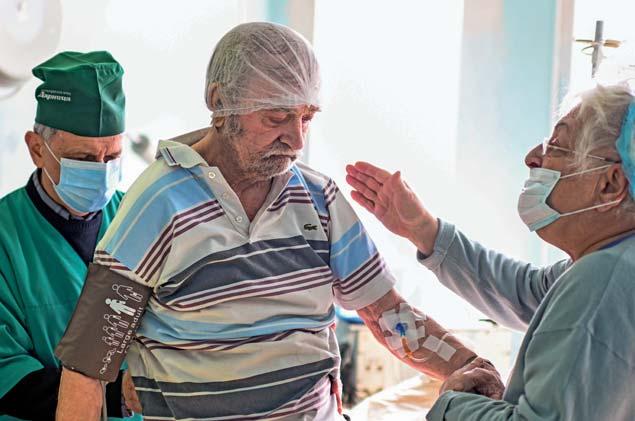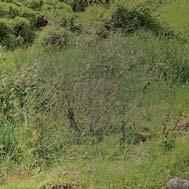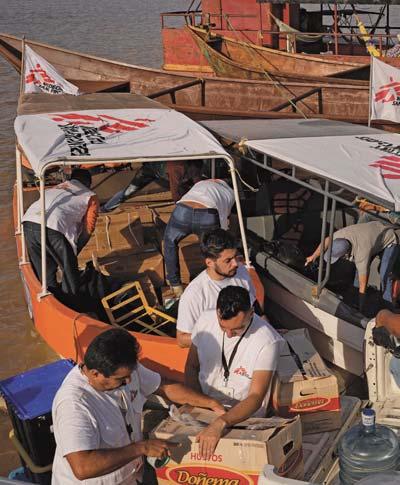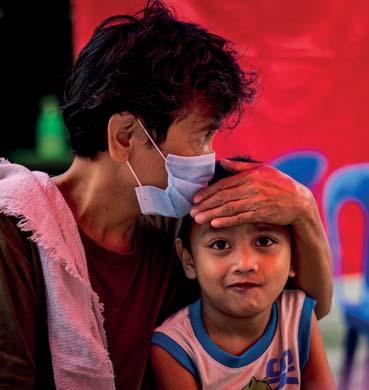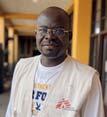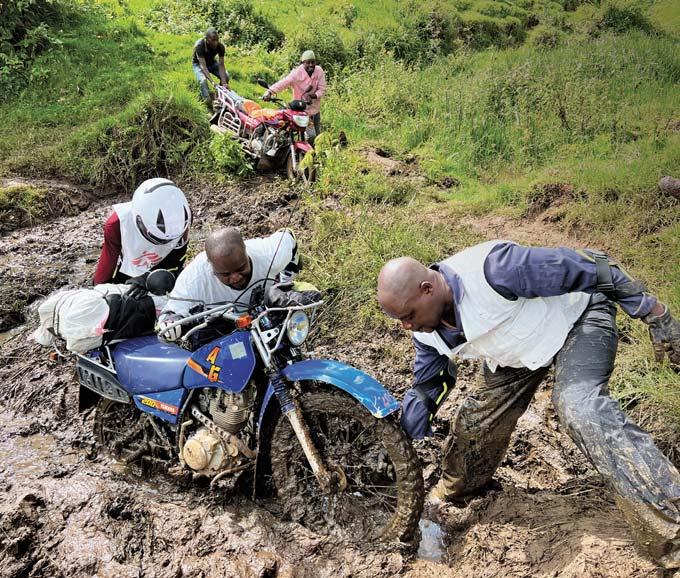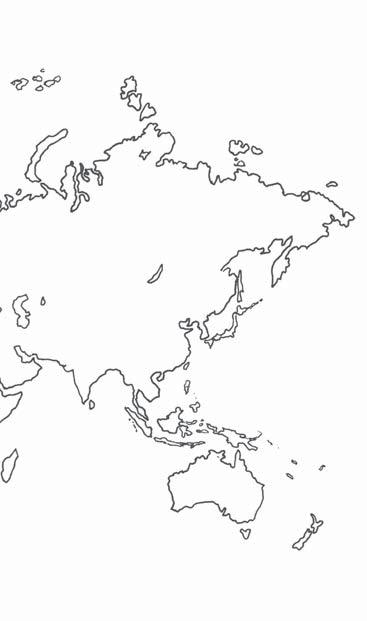‘We’re living and working inside this hospital…’
SOUTH KHARTOUM, SUDAN
INTENSE FIGHTING HAS BEEN TAKING PLACE BETWEEN THE SUDANESE ARMED FORCES (SAF) AND THE RAPID SUPPORT FORCES (RSF) IN KHARTOUM AND OTHER PARTS OF SUDAN SINCE 15 APRIL. MSF EMERGENCY COORDINATOR WILL HARPER IS LEADING A TEAM PROVIDING LIFESAVING SURGICAL CARE IN A HOSPITAL IN SOUTH KHARTOUM.
“We managed to get through to south Khartoum one week ago and identified Bashair hospital as a site where we could place our surgical team. It’s close enough to the frontline of the conflict to really save lives, but it’s also in a place where our team can operate safely.
We’re receiving dozens of patients with gunshot wounds every day, as well as people who have been stabbed, been injured by airstrikes, been the victims of violence or been injured in car crashes. We’re treating all of these injuries, alongside the sort of everyday surgery, such as emergency caesareans, that still occur when there isn’t a conflict going on.
We’re now running operations 24/7. We have an operating theatre and a post-operative care ward and we’ve built up the intensive care unit. And day by day we’re increasing the quality of care.
The situation here is difficult, to put it mildly. We have huge challenges with our medical supply and with power. We’ve been running off diesel generators for the past four days as there has been no electricity. We’re working in collaboration with community volunteers – doctors and nurses, but also young people from the area who made the decision to try to restart this hospital after it had closed and the staff had left for their own safety.
When we arrived with the surgical team, we found a hospital where people were doing all they
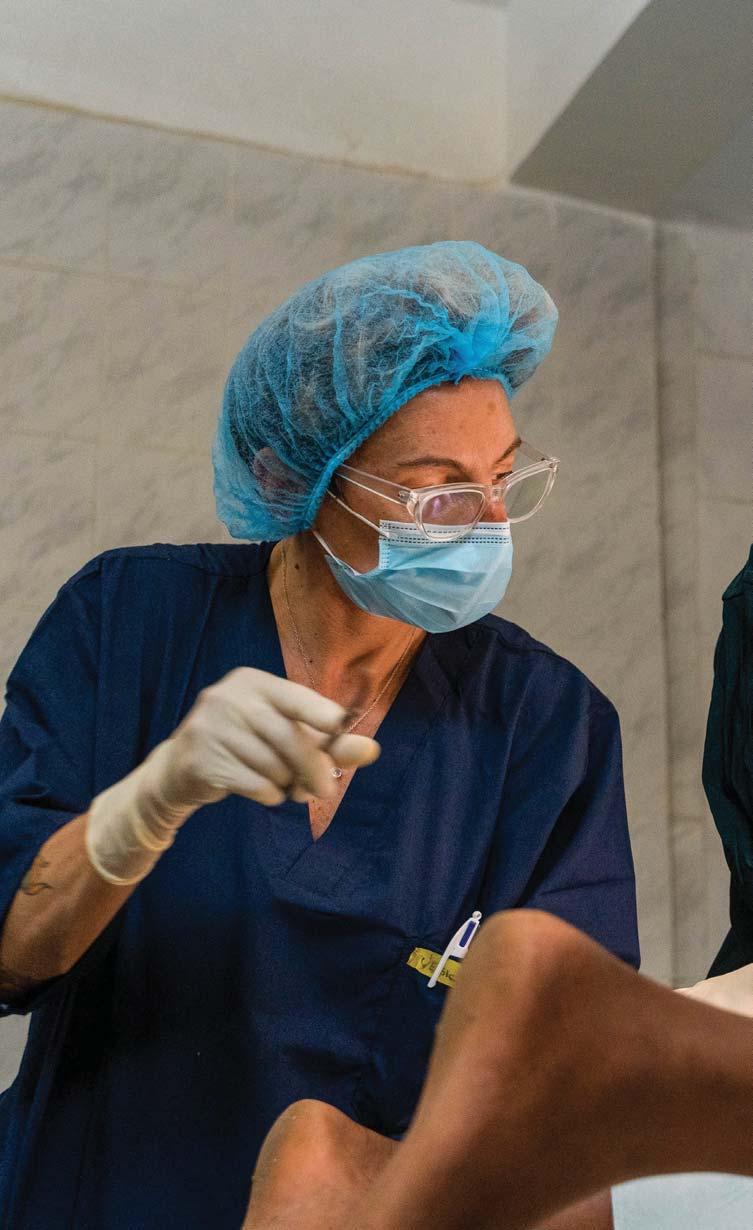
13 JUNE EASTERN CHAD
MORE THAN 150,000 PEOPLE HAVE FLED ACROSS THE BORDER TO CHAD SINCE THE CONFLICT IN SUDAN STARTED IN APRIL. MANY ARE LIVING IN MAKESHIFT CAMPS WITH LITTLE FOOD, WATER OR MEDICAL CARE. NEAL RUSSELL IS A PAEDIATRICIAN BASED IN LONDON WHO IS WORKING IN ANDRESSA IN EASTERN CHAD.
“He must be eight or nine years old, sitting on the bench and holding his little sister as they wait in line between uncountable numbers of mothers holding their sick children. I’ll call him Saleh and her Samiyah. His face is mixed with fear and determination for his sister to be seen today at our mobile clinic. Earlier I saw him kiss her head when he thought nobody was looking. He loves her. She is two, a little girl with plaited hair, seated on her brother’s knee. He says their mother is at home. I think he means she is here in the refugee site, perhaps under a shelter made of plastic sheeting, or simply under a tree. Their father, if he’s alive, is probably still in Sudan, where the fighting is.
I ask Saleh to tell me his sister’s health problem. He tells me she has diarrhoea, but you can see she is starving. Her hair has changed colour from lack of nutrients and she’s exhausted, barely connected to her surroundings. I ask to see her arms, hardly wider than my thumbs, and I gently check her arm circumference with the special measuring tape we use to assess nutrition status. Samiyah’s result is ‘Red – severe acute malnutrition’.
could to keep things functioning. They were willing to take risks to provide the care that people needed, so we’re standing with them, hand in hand, to ensure that people who live here have lifesaving surgical and medical care – to ensure that they’re not forgotten.
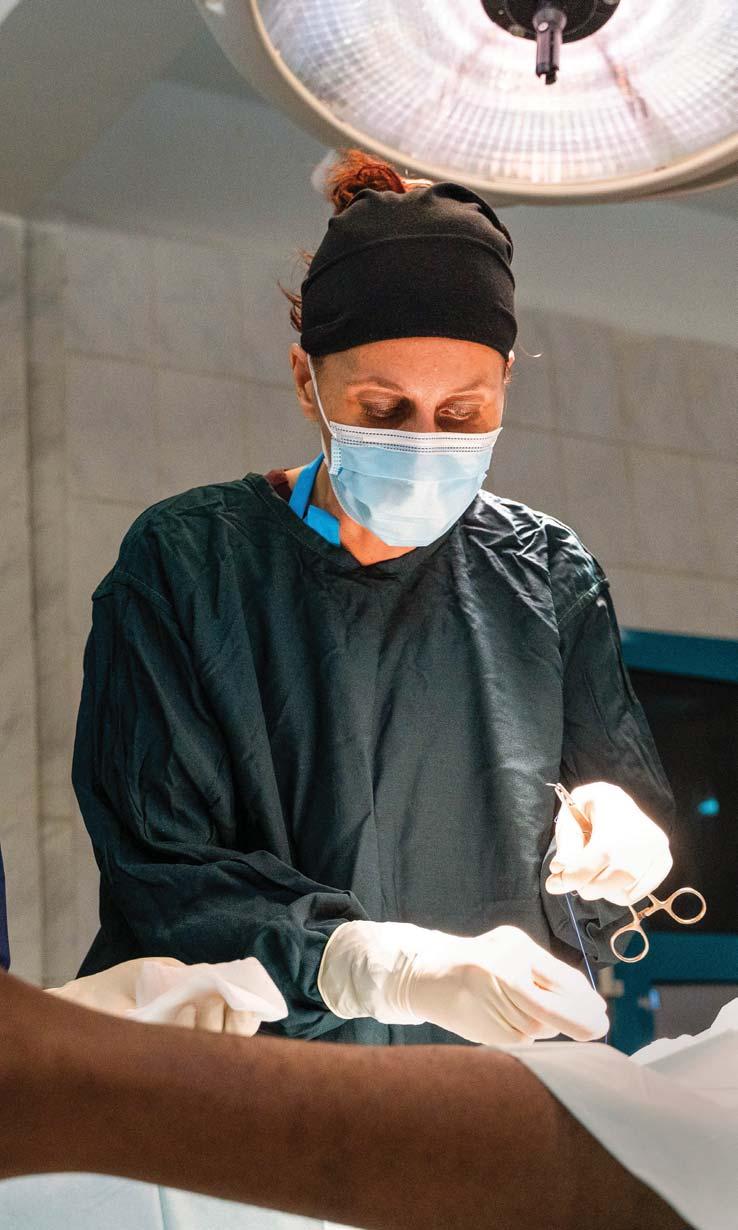
Each day feels like a week in an environment like this, but we’re seeing real progress. For MSF, it’s essential that we are here with the community. We’re living and working inside this hospital and ensuring that it’s a space that is protected and respected by anyone and everyone, from any side of the conflict. We want to ensure that our principles of impartiality and neutrality are implemented here on the ground and that any civilian who needs free lifesaving surgical care can access it here. The word is spreading that
MSF is working here and we’ve got people coming from across the city to this operating theatre. We want to ensure that everybody here gets the medical care they need.”
Between 9 May and 22 June, MSF’s team in Bashair hospital performed 506 surgical procedures and treated 284 people for gunshot wounds, 72 people for blast injuries consistent with shelling or airstrikes, and 29 people for stab wounds. MSF teams in Khartoum have treated 1,600 war-wounded patients since the conflict began.
We explain to Saleh that we will give him sachets of therapeutic food, a mix of peanut paste and nutrients specially formulated to treat malnutrition. We tell him that he must give her two sachets per day, and that we have enough to give him one week’s supply. Hopefully, I think, by that time we will be back here again with more. Hopefully the rains will not fill the wadis – the dry waterways – which could block the route to the site. Hopefully she will survive long enough to get her next ration.
That same day we see a girl Saleh’s age drinking mud, trying to filter it with her T-shirt: there is no safe water here. We see children with measles and whooping cough; disease outbreaks have already started.
We leave the site in the afternoon to get back to our base before dark, and to our horror we see the water level in the wadi has already risen, almost cutting off the path to and from the site. Looking out of the window of our Land Cruiser, I can see that the water is already above the wheels. We are not sure how we will return next week. These people are trapped; they need food, they need clean water and medicine. I hope we will see Saleh and Samiyah after they are evacuated, I hope they will get the next ration, but right now I am not sure how…”
4 DISPATCHES 13 MAY
MSF surgeon Dr Federica Lezzi (right) and operating theatre nurse Jessica Comi extract a bullet from a patient shot just above the knee during fighting in the Sudanese capital. Bashair hospital, Khartoum, 13 May.
SUDAN EMERGENCY AUTUMN 2023 5
READ MORE AT MSF.ORG.UK/SUDAN
Photograph © Ala Kheir/MSF
Girls walk to school in Band-e-Amir, a remote area of Bamyan province. Due to restrictions placed on them by the Islamic Emirate of Afghanistan (IEA), also known as the Taliban, girls are only allowed to attend school until sixth grade, when they are 11 or 12 years old.
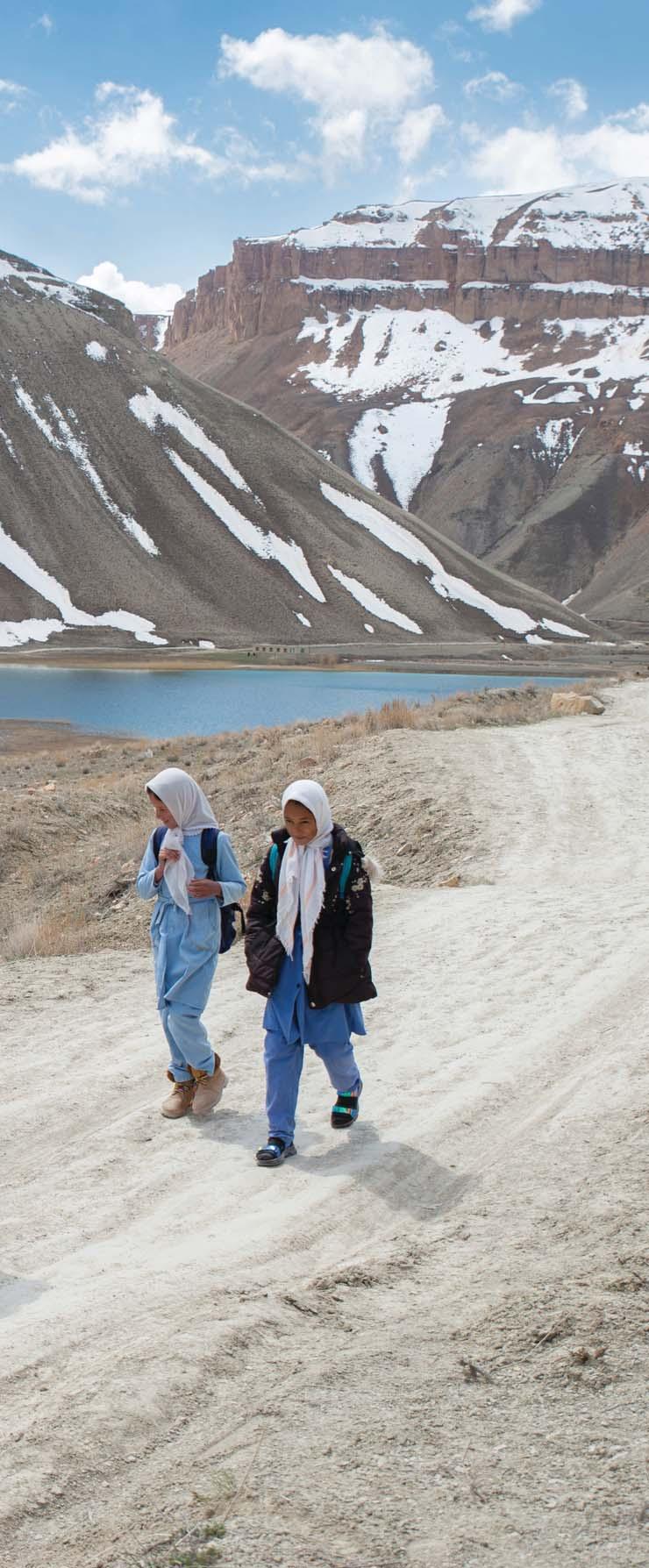
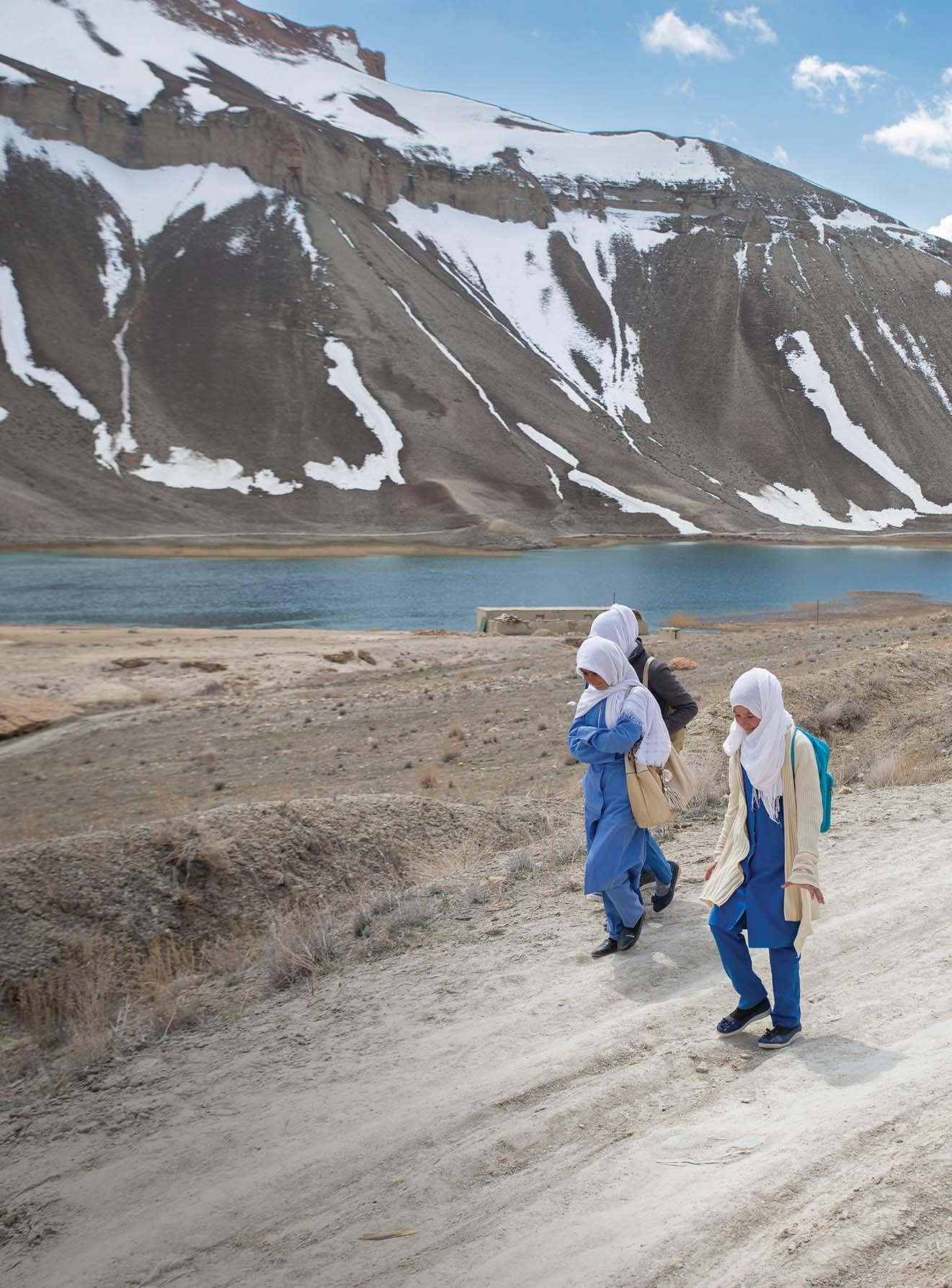
IN THE MOUNTAINOUS BAMYAN PROVINCE OF CENTRAL AFGHANISTAN, THE HAZARA POPULATION MOSTLY LIVE IN REMOTE VILLAGES, FAR FROM MEDICAL CARE…
TO THE MOUNTAINS
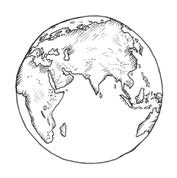
AUTUMN 2023 7
AFGHANISTAN PHOTOGRAPHY NAVA JAMSHIDI
Last year, an estimated 40 per cent of new mothers in the region gave birth without medical assistance. In late 2022, MSF constructed eight new community clinics to provide mother and child healthcare, malnutrition screenings and hospital referrals. Since setting up the clinics, MSF teams have provided more than 1,200 antenatal and postnatal consultations, more than 3,400 paediatric consultations, screened nearly 2,000 children for malnutrition and referred 75 patients for specialist care at Bamyan provincial hospital.
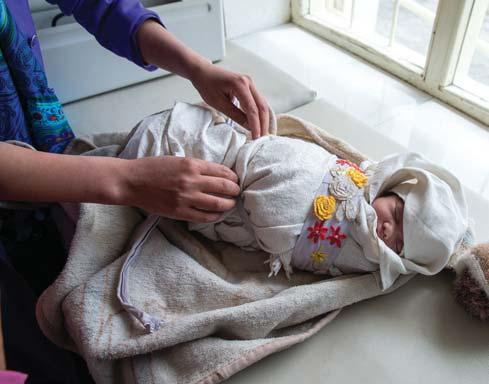
Woman and children sit in the waiting room of Jalmish community clinic, in a remote valley of Shebar district. “Before we had no place to go,” says Rohida, who has come to see a doctor about her high blood pressure. “Sometimes it feels like women have been forgotten around here. I’m happy that someone remembered us.”

Naqiba, 19, arrives for a postnatal check-up at Band-e-Amir community clinic carrying her daughter, Sakina, who is 10 days old. MSF staff at the clinic see more than 50 patients each day, most of them women and children.
Naqiba holds her eldest child in her arms as she waits to see a nurse at Band-e-Amir community clinic. “When my son was born, my mother-in-law had to pay 6,000 AFG (about £55) so that we could travel to Bamyan provincial hospital,” she says. “Now, we can finally get care closer to home for free.”
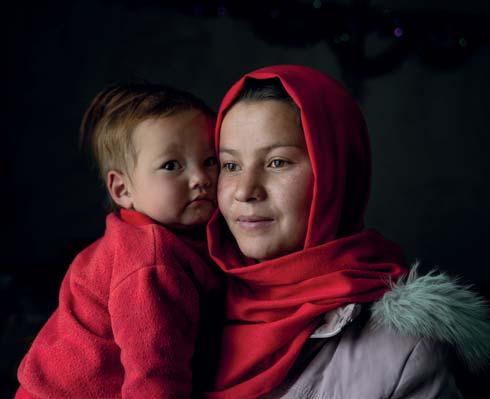
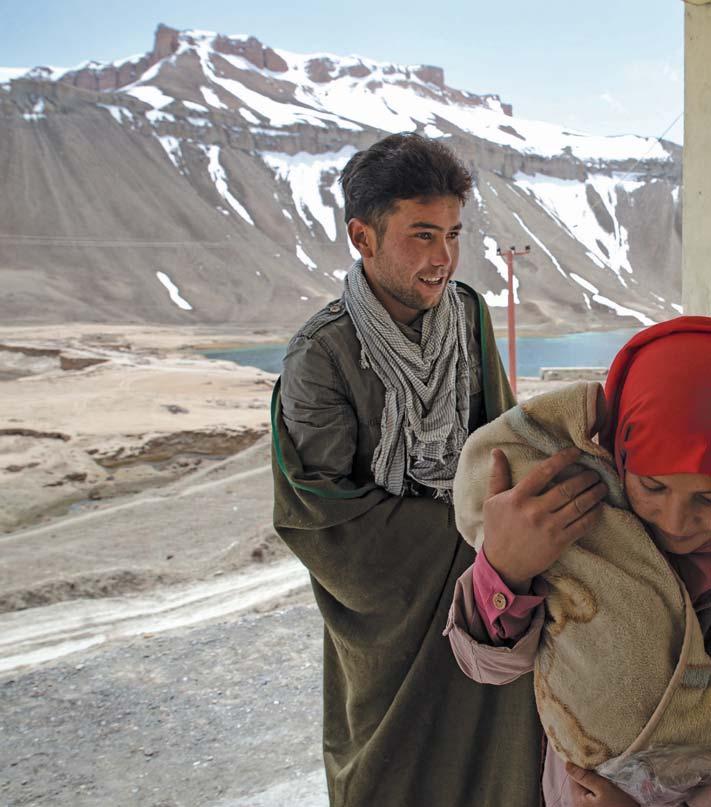
Sakina was the first child to be born in Band-e-Amir community clinic, under the care of an MSF midwife. So far this year, MSF teams across Bamyan province have helped more than 100 women to give birth safely.
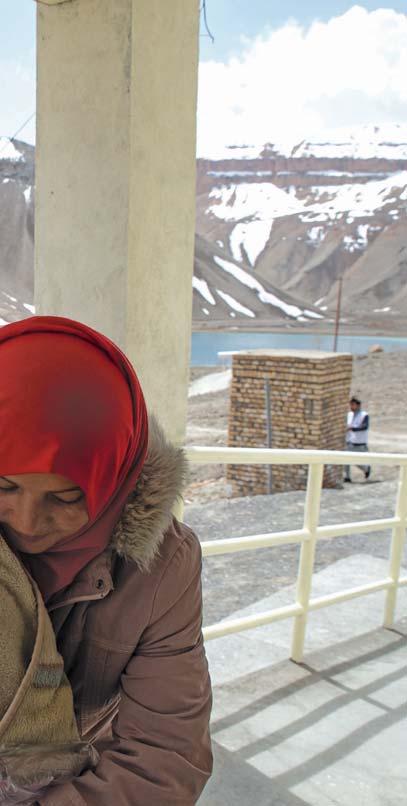
MSF midwife Hajira Mohammadi examines Khadija, who has a fever and cough caused by pneumonia, in Jalmish community clinic. The near collapse of the Afghan economy has seen food prices rise steeply, exacerbating the health crisis in this region.
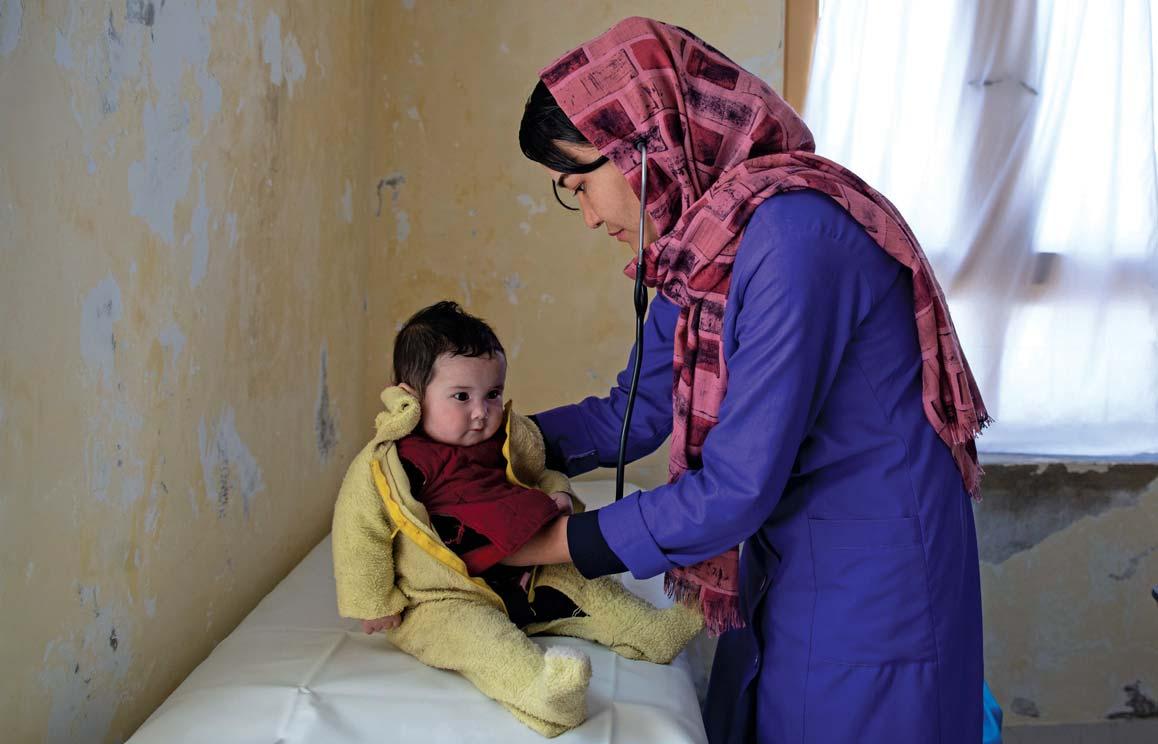
8 DISPATCHES
AUTUMN 2023 9
We’re lying down, each on our own sofa, lost in our own worlds. Someone writes their diary, someone studies a video of a new surgical technique, someone else entertains his far-away child with a video call.
The trill of a notification bursts from our three phones simultaneously and brings us back to the present.
We are in Bangui, the capital of Central African Republic: an orthopaedist, a general surgeon and an anaesthetist, here for six weeks to contribute to an MSF project. We are based in a trauma centre managed by MSF, in agreement with the state government, which sees local doctors and nurses work side by side with international staff.
The message that reaches us is an update on an arrival that was announced yesterday: the MSF plane will land with a young man, victim of a road accident 72 hours previously; attached are photos of the traumatised right upper limb.
The images flow fast; we each look up in the hope of reading a little less horror in the others’ faces. We all know that the limb will need to be amputated, without wasting any more precious time, otherwise the young man’s life will be in danger... assuming it’s not already too late.
‘Ça va aller – it will be fine, we will overcome this’: we’ve learned that here. When you’re about to be overwhelmed by discouragement, when you’re losing hope, there’s always someone who puts a hand on your shoulder and reassures you. So we gather around the table, study the photos together and discuss the surgical plan for this young man, with the pros and cons of each possibility.
The next day, he arrives. He is very young and is so weak and exhausted that he can barely tell us what happened.
Three days earlier he was driving in the distant provinces. He climbs onto the roof of his truck to better secure the goods he is transporting. Then he falls.

His right arm is bleeding and hurts badly. He manages to get back into the truck and reach a village. From there he is accompanied to the nearest medical centre, 150 km away. It is the rainy season, so the bumpy roads are in an even worse condition than usual.
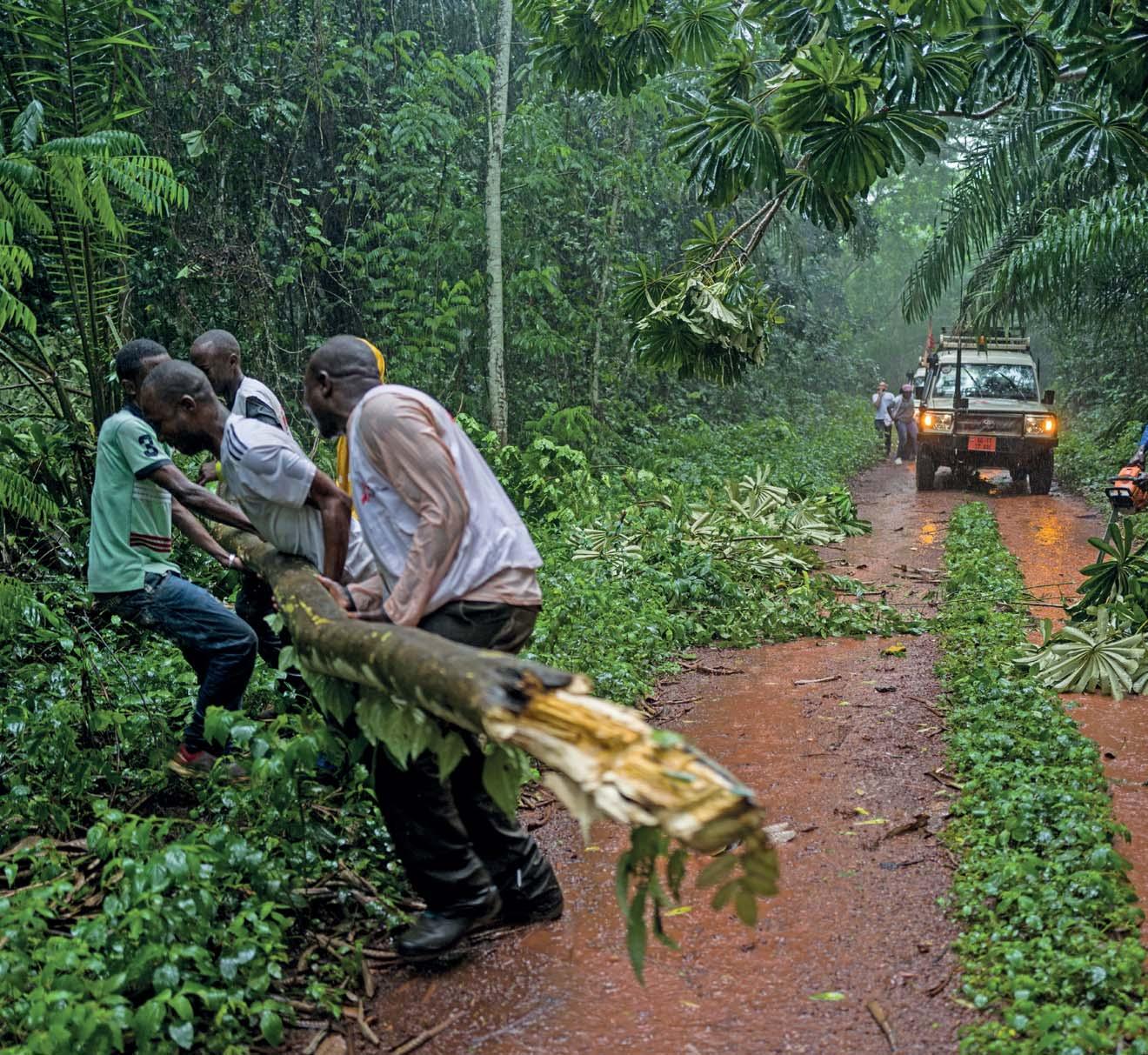
At the medical centre, the exposed fracture is stabilised and his wounds are treated, but by now he has lost feeling in almost the whole limb and can no longer move it. He has a high fever and is frightened.
This is a medical emergency.
There is a chance to save his life: MSF’s hospital in Bangui, the Sica Trauma Centre. Thanks to the coordination network between various NGOs and the local government, it is possible to organise the air transfer.
Now that he’s here with us, we have to give it our all.
When a patient is on the operating table, their final glance before unconsciousness is always directed at the anaesthetist and the anaesthesia nurse... How much courage can we try to instil in those few seconds of eye contact?
From his eyes I sense that the young man trusts us completely, even though he knows that he may not wake up, and that, at best, he will wake up without his right arm.
He’s 22 years old and he drives trucks for a living.
After the surgery, his fever and pain are gone but so is his dominant arm. I worry that he has also lost a secure future in a country with ever-poorer possibilities.
Instead, a surprise…
Thanks to his youth and grit, and the support of psychologists and physiotherapists, it looks like he is going to be okay.
Two weeks after the surgery, he runs through the corridors before calling me into the courtyard to show me the progress he has made. He is learning to write with his left hand and tells me that he wants to study. He asks me about books, especially history books.
He says he wants to study to become a teacher. ‘Because I can be a teacher even with one arm. I’ll learn to write on the blackboard with my left hand, and then it’s just reading and speaking.’
Soon I must leave him to his new future. I’m coming to the end of my assignment and preparing to return home, to Italy.
‘Ça va aller, Gabi,’ he tells me. ‘It will be fine, have a good trip’.”
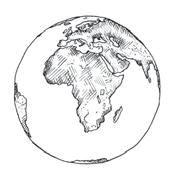
10 DISPATCHES
AUTUMN 2023 11
IN THE AFTERMATH OF A TERRIBLE ACCIDENT, MSF’S TRAUMA TEAM IN CENTRAL AFRICAN REPUBLIC FIND THEMSELVES IN A RACE AGAINST TIME TO SAVE ONE MAN’S LIFE. ANAESTHETIST GABRIELLA GREA TELLS THE STORY…
Gabriella Grea is an Italian anaesthetist.
CENTRAL AFRICAN REPUBLIC
An MSF team cut and remove trees blocking the road from Bangassou to Nzacko, where they plan to run a mobile clinic.
WORDS
GABRIELLA GREA PHOTOGRAPHY MSF “
Photograph © MSF
ANTIBIOTIC RESISTANCE IS A GROWING CRISIS AROUND THE WORLD, PARTICULARLY IN MANY OF THE PLACES WHERE MSF WORKS.
To help combat this emergency, MSF has developed the Mini-Lab, a high-quality, low-cost mobile laboratory that can be set up in two days and staffed by non-experts. The lab is designed to identify the exact type of bacteria causing an infection, as well as which antibiotics it is resistant to. With this information, medical teams can ensure that patients receive the right antibiotics.
“In many places where MSF works, there are no bacteriology laboratories, which are complex to set up and run,” says implementation manager Thomas Vidal. “This means that antibiotics are often given blindly, without knowing exactly which bacteria they are supposed to help against. The Mini-Lab changes that and allows us to see clearly where before we were blind.”
A simplified version of a classic laboratory, the Mini-Lab has been designed to be user-friendly, transportable and to streamline the most important functions of a clinical bacteriology lab.
“It was a process of trial and error working out which equipment we needed,” says project manager Céline Franquesa. “It was vital that the Mini-Lab was easy to set up and use. Following training from a microbiologist, operating it requires just two local technicians and one supervisor, compared to traditional laboratories, which require much more specialist knowledge.”
The Mini-Lab was first tested in Haiti in 2020 and is now being used in Central African Republic, Iraq, South Sudan, Nigeria and Democratic Republic of Congo.
“We’ve seen immediate results with more targeted antibiotic treatment and better treatment for our patients,” says Vidal. “We’ve also been able to see just how widespread the problem is. For example, in Maiduguri, in Nigeria, we discovered that 80 per cent of the bacteria we were examining was multidrug-resistant, which was information we just didn’t have before. This sort of information is vital if we’re going to effectively tackle the crisis of antibiotic resistance.”
Watch a video of the Mini-Lab at msf.org.uk/mini-lab
TESTING PROCESS
“The Mini-Lab tests blood, urine and spinal fluid, with full results available after 72 hours,” says Franquesa. “On day one, we send a preliminary report with some detection information about whether the sample contains bacteria. On day two, we provide additional information about the type of bacteria it contains, and on day three, when we have all the information about the antibiotic resistance, we give the final report. That’s the same timeline you will find in any conventional laboratory.”
INCUBATOR
Used to store and maintain samples at 35°C. “We developed this incubator with the manufacturer so that it can withstand a 12-hour power cut while staying at the right temperature,” says Vidal. “We often face electricity shortages in the places where MSF works, so this was a vital part of the lab.”
PRICE: £1,851
TRANSPORTED IN SIX MODULES, WHICH CONTAIN:
•Foldable laboratory benches
•Lab machines and equipment
• Documentation and training equipment



































• IT, laptops and data management equipment



The containers are plastic and impact-resistant and designed to be attached together in a container, a truck or plane.
The Mini-Lab takes two days to set up and needs 20 square metres of space.
Each bench has integrated lighting, is resistant to heat and corrosion and has a washable surface.
IDENTIFICATION PLATES
“These colour-coded plates were specially designed by MSF with our supplier in order to make identification of organisms simpler for the lab technicians,” says Vidal. “This ID system allows identification of organisms at species level to provide more accurate information for treatment and surveillance purposes. They have a longer shelf life of 12 months and can be stored at room temperature.”
PRICE: £48 for ten plates






AUTOCLAVE

A vital tool for waste management – and the most expensive item in the Mini-Lab.
“The Mini-Lab produces a lot of waste bacteria and contaminated material,” says Vidal. “It’s vital we have an autoclave to sterilise the waste before it’s destroyed.”
PRICE: £7,035
The Mini-Lab can process 10 to 20 samples per day. The Mini-Lab is staffed by one supervisor and two local technicians, who are trained on-site. Online support is provided by the Mini-Lab team in Paris.
12 DISPATCHES
AUTUMN 2023 13 6 6 1 3 2 6 3
LIKE THEIR PATIENTS, STAFF AT MSF’S TURGEAU EMERGENCY CENTRE IN PORTAU-PRINCE, HAITI, FACE INSECURITY AND THREATS OF VIOLENCE FROM ARMED GROUPS ON A DAILY BASIS. YET, DESPITE THE RISKS, THEY ARE DETERMINED TO CONTINUE PROVIDING LIFESAVING CARE. CLAUDIA* IS A NURSE SUPERVISOR AT THE CENTRE.
For several years now, Haiti has faced a serious problem of insecurity. The people of Port-auPrince face many difficulties, as sometimes it is necessary to flee the violence of armed gangs in the neighbourhoods and there is currently nowhere where people feel safe.
When MSF’s emergency centre was in Martissant, it only took me five minutes to get to work from Carrefour, where I live. [MSF had to close the Martissant centre in 2021 due to insecurity and subsequently opened an emergency centre in another neighbourhood, Turgeau]. Now, it takes me two hours to drive to work, but fortunately the team is very flexible. So when it’s difficult to get to the hospital, team members are willing to carry on working until the others, who are delayed, are available.
Every day is unpredictable. This morning, for example, everything went relatively smoothly. There were no problems on the road, it was just routine. Why did I say routine? Every time a bus drives down the Martissant road, we have to stop to give money to an armed group, and then they let us go. We shouldn’t have to adapt to this kind of life, but unfortunately we’re in Haiti, trying to survive.
I arrived at the emergency centre at 7.45 am and, as a nurse supervisor, I had to organise the day. Like every day this week, there were a lot of children in the waiting
room because we’re overwhelmed with paediatric cases. There are six beds for children and they were already full, so we had to get organised. We have to adapt every day to the influx of children.
Access to healthcare in Port-au-Prince is difficult and the cost of healthcare is high. When patients arrive at Turgeau emergency centre, they know they’re going to receive free, high-quality care. Dealing with everyone is a lot of work, but it’s also a motivation for the team to stick together to help and support them.
Since May, Haiti has been facing an increase in cases of acute glomerulonephritis. This is a disease that affects the kidneys following a throat infection or a poorly treated skin infection.
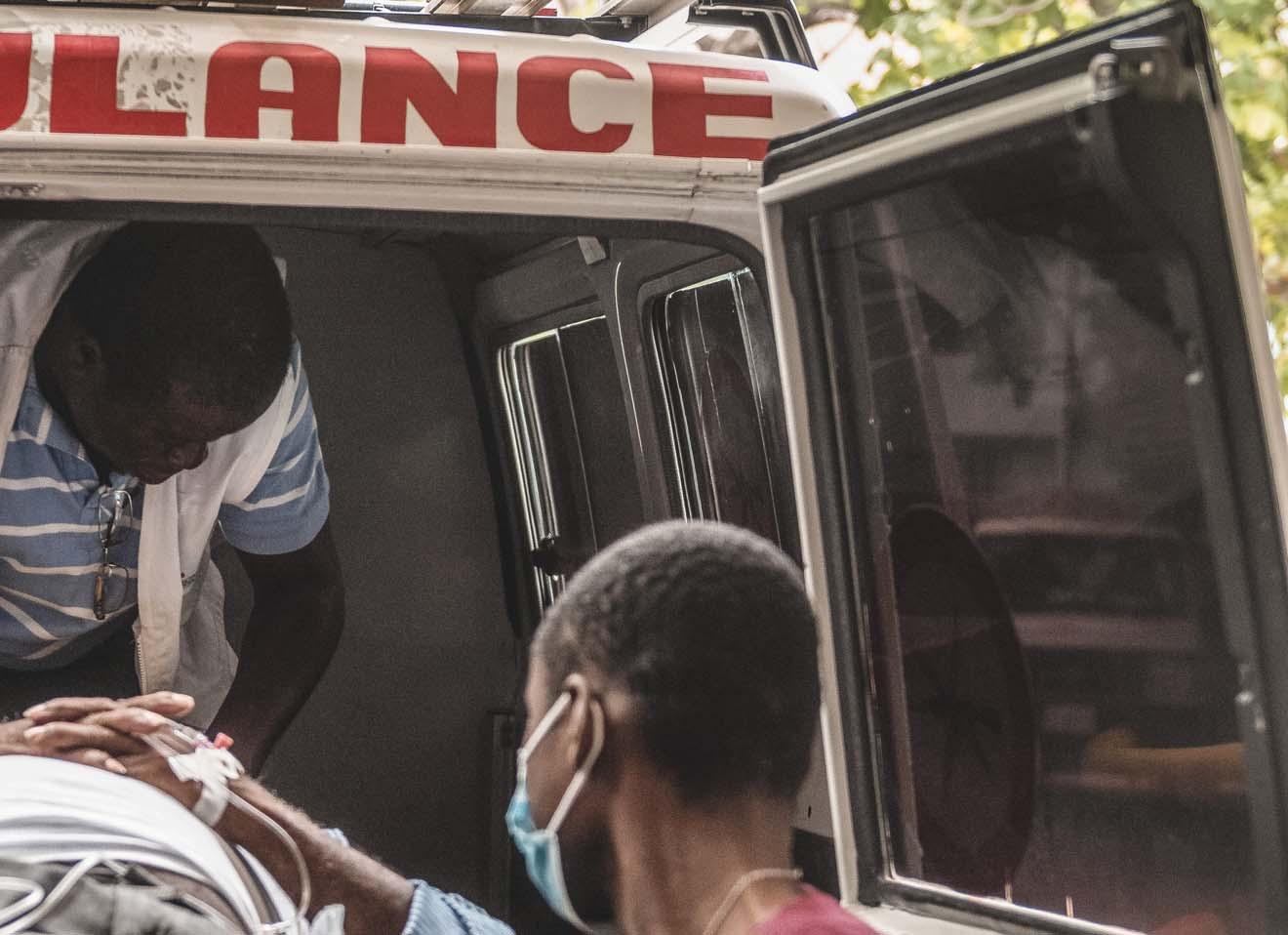


When a child arrives with a probable case of acute glomerulonephritis, we can see swelling of the face and limbs. There may also be lesions and pimples on the skin and their blood pressure is often high. Sometimes they complain of a sore throat and often they have a fever.


Although we are a stabilisation and referral centre, it’s difficult to find other medical facilities to refer these patients to, while parents often don’t have the financial means to pay the fees demanded by the referral facilities. That’s why our waiting room is so crowded. What has changed most about Port-au-Prince in recent years is the increase in insecurity. People have responded by organising self-defence movements.
Here, we give our all to save lives. Every life is special, but there are people who take pleasure in killing and hurting others – it’s horrible. Not just me, but the whole team, is committed to providing care to those who need it most. We save lives and that gives us a lot of satisfaction every day.”
14 DISPATCHES
HAITI PHOTOGRAPHY JOHNSON SABIN “ AUTUMN 2023 15
“Every time a bus drives down the road, we have to stop to give money to an armed group”
*Claudia asked to be identified by her first name only.
A patient with a head injury is taken to MSF’s emergency centre in Turgeau, Port-au-Prince.
Claudia is a nurse supervisor at MSF’s emergency centre in Turgeau, Port-au-Prince, Haiti.
MSF’S UK VOLUNTEERS
Afghanistan: Louis Dowse, Project coordinator; James Lee, Doctor; Ciara Flood, Nurse; Deirdre O’Donnell, Doctor
Bangladesh: Joy Clarke, Doctor; Patrick Sharkey, Water and sanitation manager; Deborah Malden, Epidemiologist
Central African Republic: Andrew Stevens-Cox, Hospital facilities manager; Mariana Goncalves, Water and sanitation manager; Caterina Quagliani, Programme manager; Grainne Larkin, Doctor; Alison Antunes, Health promoter; Reda Zeroual,
Nurse; Mouloud Bouchekhlal, Mental health manager; Khadidja Amireche, Logistician; Judith Kendell, Anaesthetist
Chad: Yasmine Baghdadi, Finance/HR manager; Ahmed Merzagui, Nurse; Aoife Nicholson, Project coordinator
Democratic Republic of Congo: Mark Blackford, Finance coordinator; Sarah Laoubi, Logistician
Egypt: Jacklyne Scarbolo, Medical team leader
Ethiopia: Cara Brooks, Head of mission; Alejandro Calaf Fernandez, Finance/HR manager; Clare Abdel-Basit, Health promoter
India: Nicole Hart, Deputy medical coordinator; Mary Rimbi, Doctor
Indonesia: Roger Teck, Head of mission
Kenya: Paul Banks, Procurement manager
Lebanon: Caroline Jones, Doctor
Libya: Niamh Burke, Nurse; Mourad Mansouri, Finance manager; Dahmane Dahamna, Logistician
Myanmar: Zoe Bennell, Field communications manager
Nigeria: Clare Atterton, Head nurse; Moses Soro, Finance & HR manager; John Canty, Project coordinator
Palestinian Territories: Helen Ottens-Patterson, Head of mission
Russia: Sarah Clowry, Advocacy manager
Sierra Leone: Molly Brammer, Midwife; Clare Templar, Nurse
Somalia: Dana Krause, Head of mission
South Sudan: Gillian Murphy, Project manager; Harriet Fielder, Nurse
Sudan: Rowena Neville, Doctor; Edward Taylor, Deputy head of mission; Matt Cowling, Advocacy manager; Olivia Millward, Nurse; Haithem Abdelhakim Rabehi, Finance/HR manager
Syria: Elizabeth Harding, Head of mission; Melissa Perry, Project coordinator; Emma Withycombe, Doctor
Tajikistan: Philippa Lowth, Nurse; Ruth Moore, Finance & HR manager
Ukraine: Thomas Marchese, Logistician
Uzbekistan: Kevin O’Kane, Project coordinator
Venezuela: Tamsin Nicholas, Nurse
Yemen: Rachel Coyle, Midwife supervisor
Zimbabwe: Michael Parker, Project coordinator
Cover image: MSF nurse Tania Joaquin removes a patient’s external fixators at MSF’s Tabarre hospital, Port-au-Prince, Haiti.
Photograph © Pierre Fromentin/MSF
An MSF nurse vaccinates a baby against measles at a temporary camp in Chad where 75,000 people are staying after fleeing the violence in neighbouring Sudan.
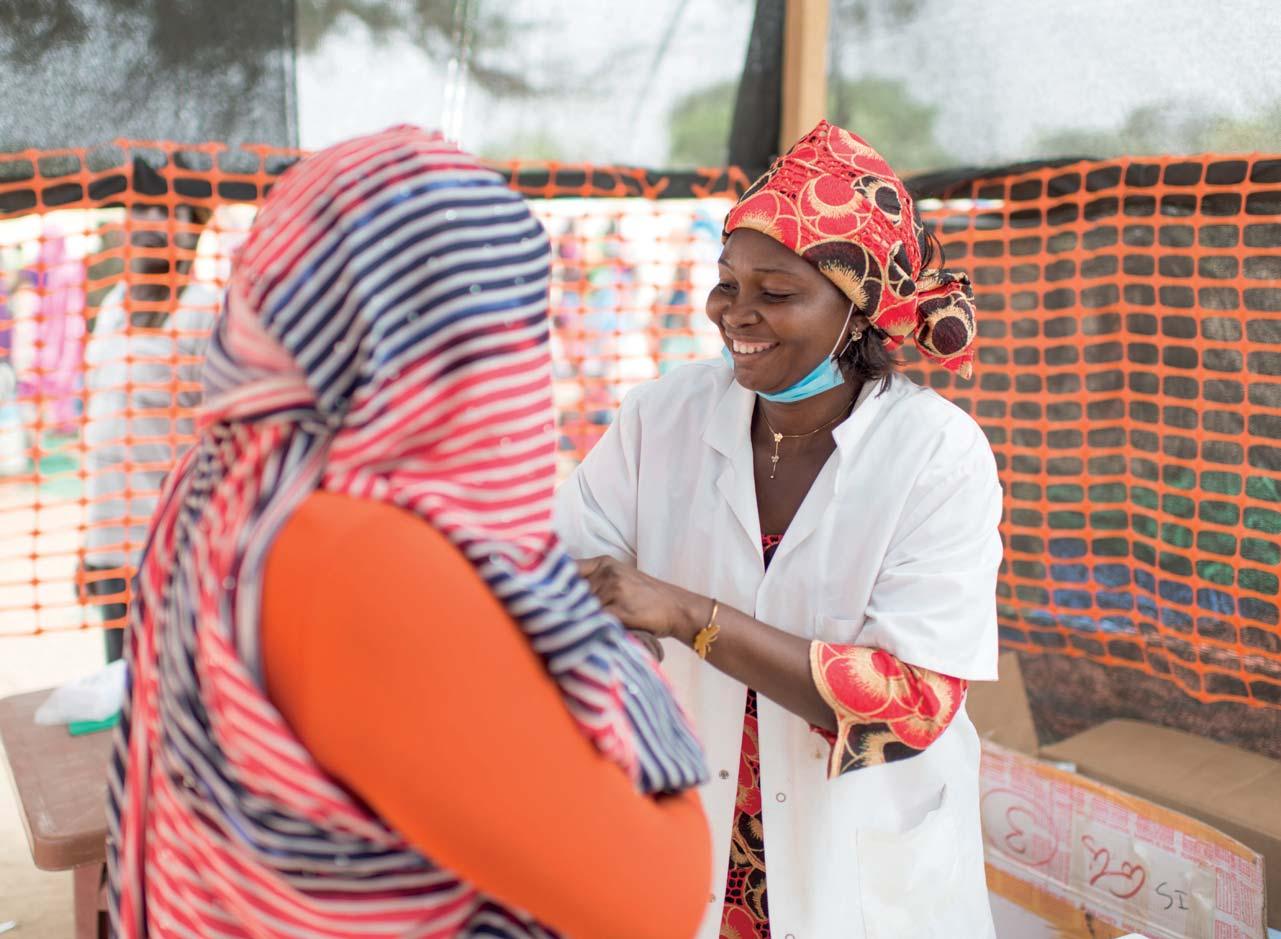
Médecins Sans Frontières/Doctors
Without Borders (MSF) is a leading independent humanitarian organisation for emergency medical aid. In more than 70 countries worldwide, MSF provides relief to the victims of war, natural disasters and epidemics, irrespective of race, religion, gender or political affiliation. MSF was awarded the 1999 Nobel Peace Prize.
TEL 020 7404 6600
ADDRESS Médecins Sans Frontières, Chancery Exchange, 10 Furnival Street, London EC4A 1AB
Charity Registration Number 1026588
ABOUT
Dispatches is written by MSF staff and sent out quarterly to our supporters to keep you informed about our medical work around the world, all of which is funded by you. Dispatches gives our patients and staff a platform to speak out about the conflicts, emergencies and epidemics in which MSF works.
It is edited by Marcus Dunk. It is printed on recycled paper and costs £0.76 to produce, package and send using the cheapest form of post. It is an important source of income for MSF and raises three times what it costs to produce. We always welcome your feedback. Please contact us using the methods listed, or email: dispatches.uk@london.msf.org
SIGN UP TO EMAIL
Get the latest MSF news delivered to your inbox. Sign up at msf.org.uk/signup
MAKE A DONATION
You can donate by phone, online or by post. If possible please quote your supporter number (located on the top left-hand side of the letter) and name and address.
LEAVING A GIFT IN YOUR WILL
Have you thought of remembering MSF in your will? Any gift is welcome, however large or small. For more information, contact Shona Barnes at: shona.barnes@london.msf.org or call us on 020 7404 6600
CHANGING YOUR ADDRESS
Please call 020 7404 6600 or email: uk.fundraising@london.msf.org
CHANGING A REGULAR GIFT
To increase or decrease your regular gift, please call us on 020 7404 6600 or email: uk.fundraising@london.msf.org with your request. Please also get in touch if your bank details have changed.
If you would like to stop receiving communications from us, please contact our Supporter Care team on 020 7404 6600 or email uk.fundraising@london.msf.org and we’ll be happy to help. Thank you for your support.
Photograph © MSF
